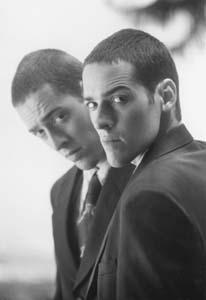![[Metroactive Movies]](/movies/gifs/movies468.gif)
[ Movies Index | Show Times | San Jose | Metroactive Central | Archives ]
 Twin Pique: Can a Siamese twin ever be lonely?
Twin Pique: Can a Siamese twin ever be lonely?
Siamese Sins The low-budget blues of 'Twin Falls Idaho' By Peter Crimmins CARNIVALS ARE a suspicious phenomenon--especially in the movies. Disregarding the dirty, unshaven carnies smelling of gasoline and working the Tilt-O-Wheel, those events of grotesque, unholy mirth are ripe with the human condition, writ large: clowns are frightening, fun houses are creepy and sideshow freaks who don't have a show are vulnerable. Conjoined twins Francis and Blake Falls, the lead character(s) of the new film Twin Falls Idaho, are freaks who have left the circus. Together they can play country songs on a guitar (one frets, the other strums). But they didn't check into a dive hotel on Idaho Street in some nameless American city (not Twin Falls) to perform for ogling rubes. One of them is dying, and the other is in love. The film is about un-freaky things like abandonment, exploitation, jealousy and superhuman emotional bonding. The story of these brothers becomes the audience's story--because, as inextricable brothers sharing the same blood and the same breath, they symbolize every intimate relationship we've ever had, except more so. The film is written and directed by and stars Mark and Michael Polish, 28-year-old twins each with his own respective set of internal organs. They know how to divide responsibilities behind the camera--Mark did most of the writing while Michael focused on storyboards and directing. Onscreen, they spend most of their time in bed in a cheap, badly lighted hotel room. Penny (Michelle Hicks), a call girl having a bad, no-rent-money day, arrives in room 7B for the brothers' morose birthday celebration. And so the story begins: a disaffected hooker and her two-headed trick, a bizarre scenario that reveals itself when you pull back the curtain of urban anonymity and enter the interior world of cheap, badly lighted hotel rooms. Penny is tired of city living, she's tired of being a call girl and she's tired of her friend asking her inane questions from a "passion quiz" in Vogue. Her mood is no doubt the result of a crappy diet, heavy eye makeup and blue, high-contrast lighting that make her look like a Goth-club queen. The twins give her the willies, but being stranded and just this side of homelessness, she softens up to the vulnerability of their entwined love and frustration. She takes a shine to the one on the left. It's a slow movie, with long pauses during dialogue scenes glued together with sparse emotive music. In order to turn Siamese on camera, the brothers had to do a lot of standing and a lot of lying down. "This film really didn't accomplish what I like about being a director because they were so immobile," Michael explains about the characters. "It was hard enough to get them in and out of a scene without using a dissolve or fade to black." If they couldn't get a lot of movement, at least they would make their compositions expressive. Scenes are static for the most part, and their dour tone elicits comparisons to Eraserhead. "Everyone talks about Lynch or Coen brothers films," says Michael, "but we based the film on paintings. We would look at Edward Hopper paintings or Vermeer. It's a combination of those two artists. The sparseness and how dark things were was Hopper. But the gentleness of how the light came in and fell was more Vermeer." THE SOMBER PACING lends itself to art appreciation and gives the characters lots of screen time to pine and brood. The Polish brothers manage to get off a few martini-dry zingers as Penny suggests that chocolate-brown double-breasted polyester suits just might come back in fashion. A weird religious strain also seeps into the film's atmosphere--through the walls comes the noise of a priest named Jesus who marries people next door; a doctor makes the sign of the cross before approaching the twins, as if preparing to touch something blasphemous. The twins' estranged natural mother dresses like a nun to pass out candy on Halloween. The hotel's ominous, anonymous hallway and the biological oddity lying inside, wrapped in a warped sort of Catholicism, give the film license to spin itself to heights of melodrama forbidden to most love-triangle stories. Where else are you going to hear someone say, "He is the reason my blood pumps and my heart beats," and really mean it? This summer's shining star of low-budget filmmaking--The Blair Witch Project--is an instruction in the power of poverty: if you don't show it, they will come. The Polish brothers used their limitations to their advantage. Without actually showing the this and the that, the film is free to focus on the nuts and bolts of conjoined twins--how they dress, who controls which toe, how they dial a telephone and, of course, the question of the manhood(s). "We get that all the time. Everyone continually asks," says Mark, "so I'm never going to answer that. But just looking at them, you can see what they share." Still, Michael adds, "I would like to think I had my own." 'Twin Falls Idaho' (R; 110 min.), directed and written by Mark and Michael Polish, photographed by M. David Mullen and starring the Polish brothers, opens Friday at the Camera One in San Jose and the Aquarius in Palo Alto. [ San Jose | Metroactive Central | Archives ]
|
From the August 26-September 1, 1999 issue of Metro, Silicon Valley's Weekly Newspaper.
Copyright © 1999 Metro Publishing Inc. Metroactive is affiliated with the Boulevards Network.
For more information about the San Jose/Silicon Valley area, visit sanjose.com.